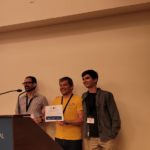

The MALINCA (MAthematicae LINgua franCA) project, led by Philippe de Groote, Hugo Herbelin, Paul-André Melliès and Carlos Simpson, has won the ERC Synergy Grant 2024 call for projects. Explanation of the scientific stakes by two of the principal investigators: Hugo Herbelin, senior researcher in the PICUBE joint project-team (Université Paris Cité, CNRS, Inria) and Philippe de Groote, head of the SÉMAGRAMME joint project-team (Université de Lorraine, CNRS, Inria) at the Loria laboratory.

How do political debates change over time to the point of polarizing the opinion of an entire population? To what extent can the influence of recommendation systems can appease or inflame user exchanges on social networks?

Congratulations to Nicolas Hubert, PhD student in the Loria’s BIRD team and in the ERPI Laboratory, for receiving two Best Paper Awards at ESWC 2024 (Extended Semantic Web Conference), the leading international conference in the field of the Semantic Web!

The pioneering new speech modelling and audiovisual voice synthesis start-up Dynalips has been officially launched. Resulting from research work at Loria (CNRS, Université de Lorraine, Inria, CentraleSupélec), subject of a maturation programme by the Société d’Accélération du Transfert de Technologie – SATT Sayens and supported by the Incubateur Lorrain, it provides animators and video game developers with an innovative lip-sync solution for the precise, automatic and rapid synchronisation of a 3D or 2D character’s lip movements with speech.

In this digital age, the security of information exchanges is vitally important, especially for electronic voting. Alexandre Debant and Lucca Hirschi, both researchers at Inria with Pesto, a joint Inria/Loria project team, identified vulnerabilities in the protocol used for the French legislative elections in June 2022 and proposed solutions for improvement that were successfully implemented in the following elections.
Read the original article on Inria.fr
